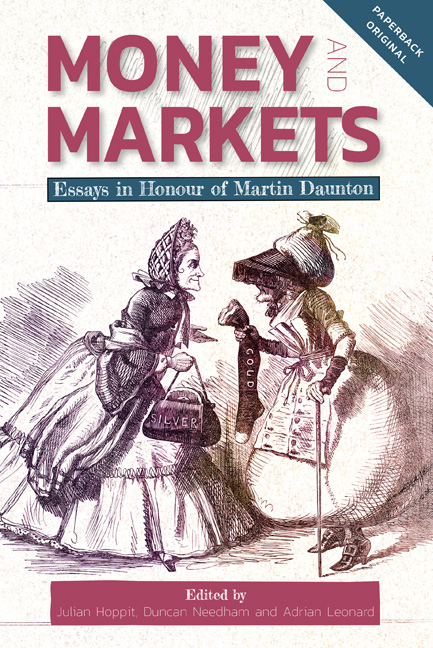Book contents
- Frontmatter
- Contents
- List of Figures
- List of Tables
- List of Contributors
- List of Abbreviations
- Introduction
- 1 Taxing London and the British Fiscal State, 1660–1815
- 2 Rents, Squalor, and the Land Question: Progress and Poverty
- 3 Marine Insurers, the City of London, and Financing the Napoleonic Wars
- 4 The Political Economy of Sir Robert Peel
- 5 Champagne Capitalism: France’s Adaptation to Britain’s Global Hegemony, 1830–80
- 6 The 1848 Revolution in Prussia: a Financial Interpretation
- 7 Imperial Germany, Great Britain and the Political Economy of the Gold Standard, 1867–1914
- 8 Knowledge, Contestation and Authority in the Eurodollar Market, 1959–64
- 9 Continuity and Change in British Conservative Taxation Policy, c. 1964–88
- 10 Britain Since the 1970s: a Transition to Neo-Liberalism?
- 11 Maplin: the Treasury and London’s Third Airport in the 1970s
- 12 Workfare and the Reinvention of the Social in America and Britain, c. 1965 to 1985
- 13 Charity and International Humanitarianism in Post-War Britain
- 14 Discounting Time
- 15 The Material Politics of Energy Disruption: Managing Shortages Amidst Rising Expectations, Britain 1930s–60s
- The Published Writings of Martin J. Daunton
- Index
- People, Markets, Goods: Economies and Societies in History ISSN: 2051-7467
9 - Continuity and Change in British Conservative Taxation Policy, c. 1964–88
Published online by Cambridge University Press: 13 April 2021
- Frontmatter
- Contents
- List of Figures
- List of Tables
- List of Contributors
- List of Abbreviations
- Introduction
- 1 Taxing London and the British Fiscal State, 1660–1815
- 2 Rents, Squalor, and the Land Question: Progress and Poverty
- 3 Marine Insurers, the City of London, and Financing the Napoleonic Wars
- 4 The Political Economy of Sir Robert Peel
- 5 Champagne Capitalism: France’s Adaptation to Britain’s Global Hegemony, 1830–80
- 6 The 1848 Revolution in Prussia: a Financial Interpretation
- 7 Imperial Germany, Great Britain and the Political Economy of the Gold Standard, 1867–1914
- 8 Knowledge, Contestation and Authority in the Eurodollar Market, 1959–64
- 9 Continuity and Change in British Conservative Taxation Policy, c. 1964–88
- 10 Britain Since the 1970s: a Transition to Neo-Liberalism?
- 11 Maplin: the Treasury and London’s Third Airport in the 1970s
- 12 Workfare and the Reinvention of the Social in America and Britain, c. 1965 to 1985
- 13 Charity and International Humanitarianism in Post-War Britain
- 14 Discounting Time
- 15 The Material Politics of Energy Disruption: Managing Shortages Amidst Rising Expectations, Britain 1930s–60s
- The Published Writings of Martin J. Daunton
- Index
- People, Markets, Goods: Economies and Societies in History ISSN: 2051-7467
Summary
In March 1988 the UK Chancellor of the Exchequer, Nigel Lawson, introduced the first budget of the 1987–92 Parliament. The centrepiece was the abolition of all rates of income tax over 40 per cent. There were at that time five such rates, with a maximum of 60 per cent. Lawson, Chancellor from 1983 to 1989, was a key figure in a Conservative government which had just won its third successive election victory. He was in a triumphant mood, boasting that he had ‘radically reformed the structure of personal taxation, so that there is no rate anywhere in the system in excess of 40 per cent’.
Others were less impressed. Alex Salmond, a Scottish National Party MP, interrupted Lawson to declare that ‘this Budget is an obscenity’, and was suspended. Shadow Chancellor John Smith described the budget as ‘an outrage … immoral, wrong, foolish, divisive and corrupting’. When Lawson announced the abolition of the higher rates, grave disorder arose in the House, and the Speaker suspended the sitting for ten minutes, an almost unprecedented event during a budget speech.
Press comment upon the changes was likewise not all favourable. Hugo Young in The Guardian wrote that the budget represented ‘the final disappearance of the last vestiges of the post-war consensus … [such that] fairness and social justice, as registered through the tax system, have ceased even to be the pretended aspiration of the Conservative Party’. The Financial Times (with more than a few wealthy readers itself) noted ‘dramatic gains for the rich’. Scholarly analysis has been similar. Sven Steinmo thought that ‘Margaret Thatcher was perhaps Britain's toughest bully … [she and her ministers] plotted a head-on attack on the distribution of the tax burden’ to help the rich. Martin Daunton echoes this in his comprehensive history of the politics of taxation in Britain from 1914 to 1979, detecting a distinct shift in the Conservative approach between the 1960s on the one hand and the post-1979 period on the other, ‘from an opportunity state to an enterprise society’. During the 1960s policy was not based on ‘crude anti-statism’, but sought to combine competition and compassion. By 1979, ‘the pursuit of incentives at the cost of social integration became possible’.
- Type
- Chapter
- Information
- Money and MarketsEssays in Honour of Martin Daunton, pp. 161 - 180Publisher: Boydell & BrewerPrint publication year: 2019

